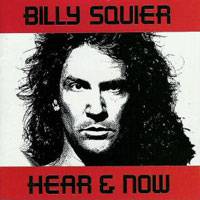This article needs additional citations for verification .(December 2014) |
| Hear & Now | ||||
|---|---|---|---|---|
 | ||||
| Studio album by | ||||
| Released | June 14, 1989 | |||
| Genre | Hard rock, AOR, pop rock | |||
| Length | 43:34 | |||
| Label | Capitol | |||
| Producer |
| |||
| Billy Squier chronology | ||||
| ||||
| Singles from Hear & Now | ||||
| ||||
Hear & Now is the sixth studio album by American rock musician Billy Squier, released on June 14, 1989. It features his last Billboard Hot 100 hit, "Don't Say You Love Me", as well as popular fan favorites and radio hits "Don't Let Me Go", "Stronger" and "Tied Up", the latter two being co-written with Desmond Child.
Contents
The disc's lead single, "Don't Say You Love Me", reached #4 on Billboard's Mainstream Rock Tracks and #58 on the Billboard Hot 100. Aided by a popular MTV music video, it became his best charting song since 1984's "Rock Me Tonite" and the last one to chart in Billboard Hot 100. [1]
The album marked a return to Squier's rougher hard rock sound following his synth-heavy Signs of Life (1984) and polished Enough Is Enough (1986), with his arena rock slightly updated to late 1980s standards. In Billboard magazine, the album had the second best chart debut of Squier's career, at #71, but only reached #64. [2] It registered at #59 on the Cash Box album index and sold approximately 300,000 copies.
Hear & Now was and still is regarded as one of Squier's better albums by his fanbase, with many of them calling it his best since 1981's Don't Say No . [3]